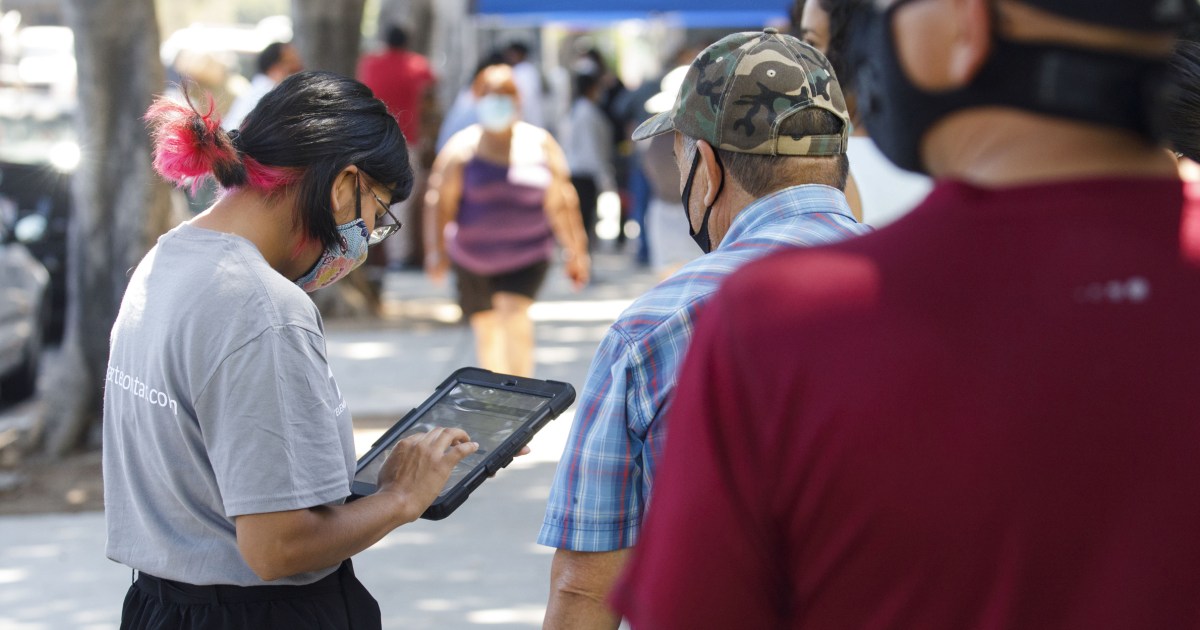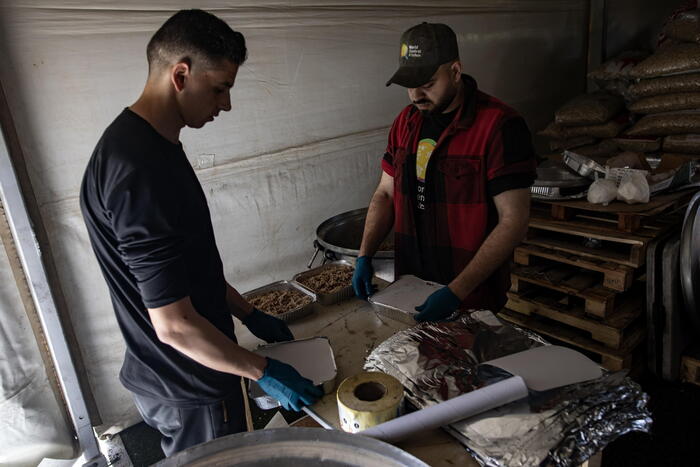LANCASTER. — Evelyn Colón kisses her elderly mother, whom she cares for in her small apartment in Lancaster, Pennsylvania, on the temple.
They arrived three years ago fleeing the disaster of Hurricane María in Puerto Rico and, like thousands of Puerto Ricans, Colón lives grateful for the new beginning but stung by the memory of her island.
"It made me very sad to have to leave Puerto Rico," he explains, "I knew that I was coming to a place where one can do many things that perhaps could not be done in Puerto Rico, apart also for the health of my parents, and here I had to my children and grandchildren ”.
Colon, a 69-year-old mother and grandmother, is busy preparing a party for her mother's 91st birthday this Wednesday, with a cake full of candles.
"We prepared," he explains about the hurricane, "but no one imagined that it would be as it was.
I started to pray, I thought 'my God this house was going to flood and I won't be able to get out', my mother was in bed ”.
“The most terrible thing came later, seeing all that destruction.
We threw everything we could into a briefcase, leaving everything behind.
It hurts because you don't know when you are going to come back;
Daddy didn't want to leave his island, ”she added with tears in her eyes.
Puerto Rican Evelyn Colón moved to Lancaster (Pennsylvania) to take care of her elderly parents, after being damaged by Hurricane "María" in 2017. Her father died in 2019 without fulfilling his wish to return to the island.
María Peña / Telemundo News
Already settled in Lancaster, his mother, who suffers from Alzheimer's, receives medical coverage.
Her father died last year, aged 93, of health complications.
Colón no longer thinks of returning to the island.
Puerto Rico already suffered from high levels of unemployment, and the hurricane accelerated the exodus, mainly to Florida, Pennsylvania and New Jersey.
The devastation drove out 125,000 Puerto Ricans in just one year, said Edwin Meléndez, director of the Center for Puerto Rican Studies at Hunter College of the City University of New York (CUNY).
Meléndez predicted that, although many returned to the island in 2019, there will be another exodus to the US due to the COVID-19 pandemic.
José Díaz, a retired Puerto Rican horticulturist and activist, said that many displaced people have been successful, but it has not been easy: "(US) citizenship helps a little,
but they go through the same things as the rest of the Latinos."
"They have come to a country that is in crisis," he added, "they are displaced by climate change, by bad policies, and many may wish to return to the island" when they cannot find the help they were looking for.
Archive image of the Amish community in Nickel Mines, Pennsylvania.Getty Images / Getty Images
Bachatas and chicharrones in the "Amish Country"
Hispanics number almost one million in Pennsylvania, mostly Puerto Ricans, Mexicans and Dominicans, according to CUNY, and thus make up 7.3% of the population, being the engine of more than 50% of the population growth in the last two decades.
Most have settled in the so-called Latin Corridor of Route 222, which includes rural Lancaster, home to the Amish, a Protestant group descended from Swiss and German immigrants who settled in the area in the 18th century.
Hispanics work with or for them.
“The Amish have managed to preserve their culture, rejecting the influence of the outside world, and we Latinos dance our bachata even in the midst of the Pennsylvania Dutch.
If there is any similarity, it is that we preserve who we are and where we come from, ”explained Norman Bristol Colón, founder and president of the Pennsylvania Latino Convention.
The Amish "can like a good chicharrón, a good pastry or a Colombian empanada, and the good thing is that our people can also influence in some way, perhaps not a complete culture, but one at a time," he added. in a humorous tone.
The Amish population has increased in the state from 44,620 in 2000 to 81,500 this year, and half live in Lancaster County, where they make up 6% of the population.
But there, Latino businesses have also flourished, such as restaurants, bakeries, auto repair shops, and financial services companies.
“I have seen an immense change in the Latino community here, many businesses.
I am proud to see that a Latino takes risks when opening a business, or to study, ”said Carlos Manuel Cruz, owner of a mechanic shop.
Cruz immigrated from New Jersey to Lancaster in 1990 to be close to his family, and began selling used tires in 2011, in a building that the Amish originally used to make carriages.
“I have seen people who have needs to adapt, but many people who come from Puerto Rico quickly are working, studying;
now its economic and political strength is being seen, "added Cruz.
The Amish "are a strong and united culture, and we can learn that from them," observed Cruz.
“To my surprise, when I opened the business I saw that most of the clients are Puerto Ricans, Dominicans, Guatemalans;
I feel like I'm in Puerto Rico.
I quickly got used to the environment, the climate, ”said José A. Rivera Aguirre, who runs the Torres Family Bakery.
Together but not mixed
Hundreds of Amish-controlled businesses also abound, including farms and ranches, furniture manufacturing, quilt and craft stores, and tourist services, employing family and neighbors.
The construction area is where younger people could work with Puerto Ricans, but the relationship is purely work, and although the Amish are a large minority, "a person can live and work in parts of Lancaster County and not have much interaction with them." explained Steven Nolt, Acting Director of the Young Center at Elizabethtown College,
“It is a matter of geography;
the Amish do not live in the city;
When we talk about a whole group, it does not mean that there will not be any with prejudices, but, in general, they are cordial, they live apart from the rest, and their relationships are about business ”, he stressed.
Jack Myer, an Amish of Chilean descent on his grandfather's side, explained that the relationship is labor due to cultural differences: the social life of Amish youth, for example, focuses on hunting, sports, and events organized by their churches.
Myer owns the company Aaron & Jessica Buggies, which offers rides in those iconic horse carriages that are part of a culture centered on faith and family, and that rejects cars and other modern luxuries.
The Amish people are made up of descendants of Anabaptists (renamed Christians) and Mennonites who fled persecution in Europe in the 18th century.
In Lancaster County, each group observes different rules regarding the use of clothing and technology, and family life.
The Amish of the “old order” do not use electronic devices or appliances, nor electric lights in their homes, and they hire drivers, many of them Latino, only in cases of emergency.
"They see us as people who like to work, who do not complain about work ... the treatment is very cordial, they are very aware of the work and if you are a good worker, that way they pay you back," said Mónica Luna Urban, a businesswoman Colombian who runs a store specializing in a product derived from marijuana.
"They are very workers"
Half an hour from Lancaster, in the town of Bird in Hand, on the Old Pennsylvania Pike, Myer's company served dozens of tourists last Saturday who, despite the leaden sky and a drizzle, asked for a carriage ride through narrow streets. roads, to appreciate the bucolic landscape.
Sporting a typical beard, straw hat and simple clothing, John King offers us a tour to an Amish farm, to explain his family history, and the Amish vision of Latinos.
“My son was a bricklayer and he worked with Hispanics, as drivers or workers, and he told me that they work hard… I don't see why there can't be a good relationship.
I think they live more like us than other non-Amish neighbors, because some grew up in the country, ”said King, whose Swiss ancestors settled in Pennsylvania in the mid-1700s.
Latinos "see that we lead a simple life, although some think that we sacrifice something with that, but we do not feel that way," he added, "we feel that it is a privilege."









/cloudfront-eu-central-1.images.arcpublishing.com/prisa/CY2A26MEDVGSFEWPX5DBVG5BFQ.jpg)